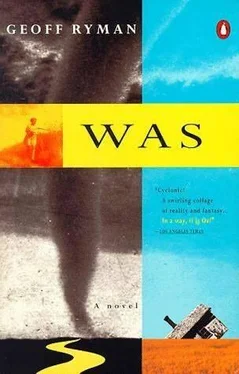The wind clutched at her adult dress and tore at it viciously.
Thy kingdom come.
Lost in a world of burning dust.
Thy will be done .
The ground beneath her suddenly gave way. She felt her boots flood with water.
On earth as it is in Heaven.
She had run into the wallows. She felt the mud suck at her feet and pull her down. Oh God, don't do this, oh God, I'll be good, I promise. Dorothy fought her way forward, thrashing with her hands. Hands were cut. Was it a thorn bush? Dorothy fell forward into rolls of barbed wire.
It had been nailed to stakes, to keep it secure, pegged firm, a maze of wire to be stretched around the fields and to encircle the wallows.
It was a great extended hollow tube of wire, a second twister. Dorothy's arms and chest were enmeshed in its embrace. She thrashed against it, arms working their way deeper into it. The mud pulled down. The wire held.
The twister wanted her. It roared in anger and pulled. Dorothy was snatched up. The wire sang. The wire extended like a spring; the mud pulled down. One end of the wire broke free. Dorothy found a fence post and grabbed it and held, and the loose spiral of wire turned around and around her, lashing her to the post, holding her to its wooden bosom as if to say, I will keep you, Dorothy, I will keep you in Kansas. The wire whipped around her, binding her tighter and tighter. The mud tried to pull her down. Overhead was the flock of sunflowers. They still giggled. Dorothy was held.
And in the dust, part of the dust, there was a nittering. Dorothy felt a cold wet nose. Toto climbed up onto her lap. She could feel his shivering warmth; she could feel his rough, loving tongue.
And the dress, the old dress slipped free from under her arm.
Dorothy blinked. How had it become so clean? It seemed to her that it was white, blazing white and covered in sequins. They flashed in the sunlight that peeked under the clouds. It ascended.
The dust was as thick as syrup and Dorothy had to close her eyes. Dust sizzled on her face like fat dancing on a hot, hot pan, and her skin was scoured. She stroked Toto with her raw hands; she could feel his fur like pine needles. You led me right, dog, she thought. The wire held her.
The wind shrieked and scraped. It passed singeing over her, enveloping her, brutalizing her with its love, like any love she could remember.
Then, as if something had popped, everything went still. Dorothy had time to open her eyes. In the center of the twister, the air was almost clear and everything was a beautiful blue. Blue Earth. Everything stood up straight, the grass, her hair, the wire, all hauled toward Heaven. She seemed to see buffalo, swirling up into it. All the extinct creatures had been pulled into Heaven. Dorothy had time to be glad. The twister drank the air out of her lungs. The Indians sang:
Wichita ta ta
to to
tot tot
ta ta
Then the singing stopped.
Waposage, Kansas-November 1956
The Wonderful Wizard of Oz was kept off most public library shelves until the 1960s because librarians considered it hackwork. When Cornelia Meigs edited a 624-page Critical History of Children's Literature for Macmillan in 1953, there was not a single mention of Baum in the book . The Wonderful Wizard of Oz does appear in the fourth edition of May Hill Arbuthnot's Children and Books, revised by Zena Sutherland and published in 1972-but it does not appear in the first three editions, and in the 1972 edition, it is simply listed among "Books that Stir Controversy." -Aljean Harmetz, The Making of the Wizard of Oz
The hostility to the Oz books is in itself something of a phenomenon…
It is significant that one of the most brutal attacks on the Oz books was made by the director of the Detroit Library system, a Mr. Ralph Leveling, who found the Oz books to have "a cowardly approach to life." They are also guilty of "negativism." Worst of all, "there is nothing elevating or uplifting about the Baum series." For the Librarian of Detroit, courage and affirmation meant punching the clock and then doing the dull work of a machine while never questioning the system. -Gore Vidal, in an essay, "The Oz Books"
Bill Davison had a few months to go before he got his draft notice, so he went to work in the Home. He was hired for his muscles. Bill Davison had been a linebacker on the school football team, had fairly bad grades and was generally recognized to be a nice guy. He was huge, happy and surprisingly gentle. Girls loved his gentleness. He was seventeen now and engaged to his girlfriend, Carol. He was a practicing Christian and had the bravery and confidence to be kind to his mother in public.
His father had been killed when he was six, during the Italian campaign. The experience had been terrible for him. He had needed and wanted his father, kept photographs of him in his uniform, had a map on the wall that traced with pins where his father was. The news of his death had been delivered personally by a friend of the family at the recruiting office. War had taken Bill's father away and would make of him a young man whose urges to violence were all sublimated into sports.
Bill's grades were bad-straight C's. Even so, people were surprised when he took on work at the Home. Who cared about grades? Bill was a presentable young man and could have gotten a good job behind a counter or in an office somewhere. Fat white women with too many kids ended up working at the Home, or blacks, or Mexicans. The Home was one of three state institutions for the mentally ill in all of Kansas. The citizens of Waposage were rather proud of their provision for the insane. They just didn't want to work in the place. Bill did.
He wasn't sure why. "Oh, I don't know," he would tell people. "I guess I just wanted a job helping people. The Home was nearby."
Since graduating in June, he had been working in an electrical supply store and showroom. It was run by Mr. Hardie. He was one of the many friendly older men who thought they had taken on the job of acting like a father to Bill.
"People in the Home can't always be helped," said Mr. Hardie, when Bill told him he was leaving the store.
"Well. They still need caring for," Bill replied.
"That's true, Bill, and it's a fine thought. But you still have got to think of yourself, and of Carol too. They won't be paying you much money for that job."
"Carol's got her job at the hairdresser's. And anyway, I got the Army coming up in a couple of months. It's just till then."
"From now on," said Mr. Hardie, "you got to be thinking of how you're going to set yourself up in life. You got to be thinking about what's going to happen after those two years. You find things are getting tight over the next few months, or you just want a change of scenery, you know there'll always be a job waiting for you here in the store. Need a fine young man like you."
Bill knew he was a fine young man-he had worked at it-but he wore his knowledge lightly. "Thank you, Sir," he replied.
Bill Davison started work in September 1956, in the geriatric ward. He would always remember arriving. On his first day at the Home, he was shown around by another orderly. The man's name was Tom, Tom Heritage. Tom was tall, plump, friendly, and had a very nearly invisible blond beard. He had been a truck driver until he lost his license for three years.
"First thing you do every morning is help wheel up the food from downstairs. Then, while they're eating, we change all the bedding. Some of them leak a little, so we just give them clean sheets. You make their beds for them, tidy up. During the day you help some of them around, maybe take them for a walk. If any of them get sick, you help them down to the infirmary."
Читать дальше












